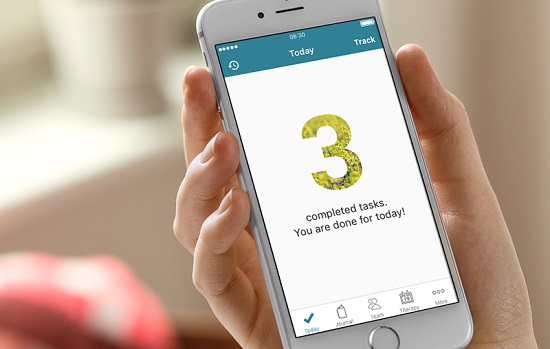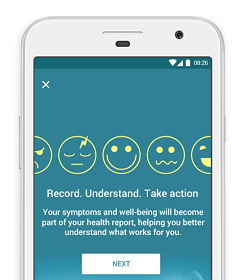Calming Effect: Get Your Anxiety Under Control with a Medication Management and Mood Tracker App
Generalized Anxiety Disorder can be Debilitating. Take Back Control of Your Thoughts, Feelings, and Behavior with MyTherapy

Everybody worries from time to time, but if the worry becomes excessive and persists for several months and interferes with thoughts, feelings, and behavior, then you may have what it is called generalized anxiety disorder (GAD). This condition is exhausting – both physically and mentally – as it interferes with sleep and drains you of your energy. If you have GAD, you will find it difficult to control your worry and expect the worst even when there is no apparent reason for concern. In America alone, GAD affects 6,8 million adults in any given year.
A number of treatment options exist to help you with GAD, such as therapy and medication (usually SSRIs). The treatment plan can be overwhelming at first, especially if you now have to take medication daily and attend therapy. To help you with planning and forming a schedule, smartphone apps, like MyTherapy, can offer you valuable support. MyTherapy generates medication reminders and comes with a comprehensive health journal to help you manage and control GAD.
Generalized anxiety disorder requires treatment, either in the form of medication or therapy. The most effective treatment plan is typically a combination of the two. Relaxation techniques, like yoga and exercise, and mindfulness can also help. MyTherapy can support GAD treatment in several ways. Firstly, if you are prescribed medication (anti-depressants, for example), the app will generate medication reminders, reminding you when and how to take your medication. You will be reminded via both an alarm (which you can also set to vibrate or silent) and a pop-up notification. You can also use this reminder functionality for doctors’ and therapist appointments. You can also change the alarm reminder times on weekends, meaning that the app will fit in with your lifestyle. When taking medication for anxiety, especially anti-depressants, for example, it is important to take your medication everyday as prescribed. This will not only alleviate symptoms but also prevent side-effects. To add the medication, you can use the app’s barcode scanner, search in the app’s database, or upload manually. Once you’ve done this, the app will do the rest, giving you some much-needed peace of mind.
Secondly, the app comes with a digital health diary. Tracking your mood and symptoms is an important part of managing and controlling your anxiety, and the health journal will allow you to do this with its symptom and mood tracker. You can also use the diary to set daily exercise goals, like running, swimming, or yoga. At the end of the month, all the data you’ve entered into the app is compiled into a health report. You can choose to share this with your doctor or therapist, helping him/her see how you are progressing with treatment and if you are managing to control your anxiety effectively.
The team at MyTherapy also takes user feedback seriously, meaning that the app is consistently being updated and improved upon. The app also comes with privacy features (such as setting a passcode on the app so that no one else can access it) and your data will always be protected.
More Than Just “Normal Worrying”
General anxiety disorder, also referred to as GAD, is a long-term condition that is characterized by excessive and exaggerated worrying without any apparent reason. If you have GAD, you may anticipate disaster and be overly concerned about many things, like health, family, relationships, work, daily tasks, and money. The worry is unrealistic and irrational and you will find it almost impossible to control. The constant anxiety interferes with daily functioning and can have a negative impact on all aspects of your life. Furthermore, sometimes just the thought of getting through the day produces anxiety and you’ll typically feel out of control and unable to stop the cycle of worry.
The symptoms of GAD can affect your emotional, behavioral, and physical well-being. The severity of the symptoms varies from person to person and may include the following:
Emotional symptoms
- Constant and uncontrolled worrying
- Inability to tolerate uncertainty
- Feelings of apprehension or dread
- Restlessness
Behavioral symptoms
- Inability to relax
- Difficulties concentrating
- Avoiding situations that cause or increase anxiety
- Delaying tasks because of feeling overwhelmed
- Irritability
Physical symptoms
- Feeling tense, muscle tightness, body aches
- Problems falling asleep or staying asleep
- Stomach problems, nausea, diarrhea
- Excessive sweating
- Headaches
- Trembling or shaking
- Being easily fatigued
- Muscle tension and aches
- Irregular heartbeat
- Shortness of breath
- Dizziness, sickness
- Increased heart rate
In addition, people with GAD often have other anxiety disorders, such as panic disorders, phobias, and obsessive-compulsive disorder.
It can be difficult to diagnose GAD, because it is similar to other mental health conditions, like depression. Generally, GAD is diagnosed if you have symptoms for six months or more. Your GP will also conduct physical examinations or blood tests to rule out other illnesses that may be causing the symptoms, such as anemia or hyperthyroidism. GAD is a real, serious medical condition - just as real and serious as physical disorders, like heart disease or diabetes.
Factors that Trigger GAD
The exact causes of generalized anxiety disorder are unclear. However, it is likely that a combination of factors plays a role. Some of these factors include:
- Genetics: there appears to be certain genes that increase a person’s susceptibility to GAD. If a close relative has GAD, you are five times more likely to develop the condition as well.
- Brain chemistry: GAD is associated with the abnormal functioning of certain nerve cell pathways that connect certain brain regions that are involved in thinking and emotion. People with GAD also typically have an imbalance of certain brain chemicals, especially serotonin and noradrenalin. These chemicals are involved in mood regulation.
- External factors: alcohol or drug misuse, domestic violence, child abuse, bullying, or other stressful life experiences and traumas can also contribute to the development of GAD.
Treatment with Medication and Therapy
There are several treatments available that can relieve the symptoms of GAD. Often, treatment includes a combination of medication and psychological therapy, such as cognitive behavioral therapy (CBT).
Medication is usually prescribed to treat severe forms of GAD where the disorder interferes with daily functioning. The specific medication therapy depends on several factors, such as length of treatment, side effects, and possible interactions with other medications. The different types of GAD medication include:
- Selective serotonin re-uptake inhibitors (SSRIs): this is a type of antidepressant (citalopram, escitalopram, fluoxetine) that can be taken on a long-term basis. It increases the level of serotonin in the brain.
- Serotonin and noradrenaline reuptake inhibitors (SNRIs): this is a different type of antidepressant (desvenlafaxine, duloxetine) that increases the amount of serotonin and noradrenaline in the brain.
- Pregabalin: this drug is also used to treat conditions like epilepsy and is known as an anticonvulsant.
- Benzodiazepines: these are a type of sedative that should only be used to treat severe types of GAD. They should not be taken for more than four weeks, as this increases the risk of addiction.
Psychological treatment is often recommended for mild forms of GAD and complements drug treatment in severe forms of the disorder. Cognitive behavioral therapy (CBT) is one of the most effective forms of psychological treatment. In CBT sessions, the patient learns to identify and overcome thought patterns and behavior that lead to anxious feelings. The aim of CBT is to reduce distorted thinking and look at worries more realistically.
Start MyTherapy for peace of mind, day by day.
If you have GAD, the last thing you need is to have more reasons to worry, such as remembering when to take medication and do exercises given to you by your CBT therapist, for example. To help you with these aspects of your treatment, smartpatient developed MyTherapy, an app that can give you the support and encouragement you need to take your medication responsibly and track your well-being. With MyTherapy, medication adherence is turned into a simple to-do list that you can tick off as the day goes by. Furthermore, the comprehensive health journal encourages you to track your symptoms and mood, which can give you and your doctor a good overview of how you are doing and if treatment is working. Every aspect of the app has been developed to give you peace of mind about your health. Stop worrying and start living with MyTherapy today.


